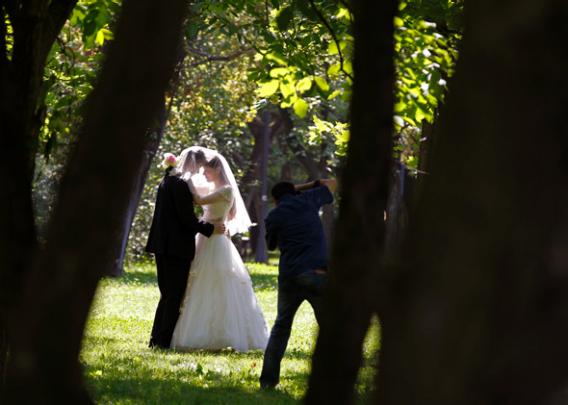I love this short little story from Prodigal Magazine because it gets to the essence of practical, ordinary, every day Christianity. No high-drama or grand spectacle. Just a mundane miracle.
Religion
Monday Mormon Mormonism: Aspirational Obedience
I had a conversation with my mum yesterday where I mentioned this idea of “aspirational obedience” that I’d been thinking about. She said it would make a good post, and I like to do what my momma tells me to do, so today’s post at Times And Seasons is on that topic. I also threw in some related concepts, like the idea that guilt is usually a symptom of pride and the relationship between goal-setting and humility.
Comments are off on this post, but y’all can contribute to the original post at T&S if you feel so inclined.
Meet the New Catholicism, Same as the Old Catholicism
The Internet was all abuzz this week with news that Pope Francis had announced bold, sweeping changes to Catholic teachings on abortion, gay marriage, and contraception. Except, of course, that he hadn’t. Even a little bit.
This is the second time that Pope Francis has issued statements that amount to basically restating fundamental Christian theology, and has been met with awestruck praise from the mainstream press for revolutionizing the Catholic faith. Don’t get me wrong: I’m pleased (even as a non-Catholic) that everyone seems to love the New Catholicism so much. I’m just scratching my head because it is actually the same as the Old Catholicism.
Of course that’s a bit of an exaggeration: Pope Francis’s tone is markedly different. But that doesn’t actually justify all the “did you hear what the Pope just said!?!?!” coverage that is coming out, because the secular press is just as incapable of understanding the New Catholicism as it was of understanding the Old Catholicism. It hated the one and loves the other, but it understands neither.
Divine Feminine: Early Polytheist Israel Includes Goddess Worship

For those familiar with the work of Margaret Barker and other similar Biblical scholars, this is not breaking news. The worship of multiple (including female) deities, pre-dating the first temple period has been researched and written about for a long time. But the additional evidence, of course, does make it increasingly hard for those who want to claim the root of the monotheistic, Judeo-Christian thought reaches back to the dawn of time instead of the revisionary, Deuteronomist scribes in King Josiah’s day, will have difficulty contorting around this kind of information. As a Mormon who takes Joseph Smith’s teachings about a “Heavenly Mother” and his King Follett sermon seriously, this already synthesizes with my religious worldview.
Digital Drama: The Way to Keep Mormon Theatre Relevant?
I believe that keeping the flame of Mormon drama alive is important. Especially at my faith tradition’s still early stage of development as a religion and a culture, we already have a rich heritage of dramatic literature filled with a wide range of excellent plays.
As an effort to preserve and publicize that heritage, Zarahemla Books published Saints on Stage: An Anthology of Mormon Drama, which includes theatrical works by some of Mormonism’s best dramatists. Michael Perry has recently been collecting a lot of Mormon plays under the umbrella of his Zion Theatricals, which licenses performance rights for Mormon themed drama to theatre companies and community groups. Angie Staheli has been encouraging production of LDS drama on the stake level at her blog LDS Plays. In the realm of higher education, Brigham Young University and Utah Valley University continue to produce works by Mormon student playwrights, while independent theatre companies such as the Echo Theatre, Leilani Productions, and my own Zion Theatre Company continue to include Mormon drama in their seasons. There are many individuals and organizations who are striving to continue to vibrant tradition of creating theatre that is informed by the spirituality and beauty of our faith tradition, even when it isn’t explicit in its religiousness.
Yet despite these exciting developments, it sometimes feels like we lose as much ground as we gain, and that we are more often than not treading water. So I’ve been trying to analyze and figure out ways of making Mormon drama not only relevant, but also exciting and profitable, so that it can continue onward. As I’ve mentioned before, I believe the relatively new trend of digital theatre seems to be an effective and exciting route for Mormon Drama to take.
My Thoughts on Slate’s Article About Mormon Weddings
Slate has an interesting article about the exclusivity of Mormon weddings. I thought I’d weigh in and share some experiences about the decisions my wife and I made.
The background is just a little complex, but here goes. First: Mormons believe that marriages can be “for time and all eternity” instead of “till death do you part.” This is based on a ritual Mormons call “a sealing” by which the husband and wife are “sealed” together for eternity.
Second, this sealing can only be performed in Mormon temples, which means that only adult Mormons in good standing can attend. If you are not a Mormon, not in good standing, or too young then you can’t come.
In theory, this is not a problem, because in theory a “sealing” and a “wedding” are not the same thing. In many countries that don’t recognize Mormon sealings as legally binding, Mormons have to get a civil marriage first and then they go to the temple to get sealed. But in the United States, a temple sealing is legally recognized as a marriage so you can just have the temple ceremony and that’s it.
If you make that choice, then friends and family who can’t enter the temple feel excluded. The logical choice, then, is to go ahead and continue to separate the sealing from the wedding, but the Church has discouraged this for the past few decades with a policy that says that if you get married civilly first (in the US, where that’s optional as opposed to a necessity) you must subsequently wait a full year to be sealed in the temple.
The Slow Hunch: “Be Still, My Soul”
I spoke in church yesterday on the subject of “peace” and posted it at The Slow Hunch. For those of you who may be interested in theology and ethics, you might enjoy it. I not only discuss ancient Hebrew concepts, but I also quote from The Dresden Files and our very own Nathaniel. Check it out.
Monday Morning Mormonism: Paradigms and Stumbling Blocks
For today’s Times And Season’s post, I talk about the meaning of the phrase “stumbling block” (using the historical use of the term “tipping point” as an example) and then outline what I think is the greatest stumbling block facing the Church today: an assumption that righteousness is closely correlated to leadership callings.
The Modesty Wars
I initially wrote this post as an irate response to this post from By Common Consent, but I decided to let it simmer for a few days. I knew that Angela C, who wrote that BCC post, didn’t really deserve to be singled out as the target for my ire when she was really just the straw that broke the camel’s back.
So, instead of tackling her post point-by-point, I want to get to what really fundamentally bothers me about the modesty wars. I guess I should start by defining the modest wars.
If you’ve never heard of the phrase that’s OK because, as far as I know, I just made it up. It refers to the odd feminist-vs-feminist battle between social conservatives and social liberals that centers primarily on modest dress. The conservative view is that immodest clothing is intrinsically sexually objectifying and therefore disempowers women. Probably the best proponent of this view comes from Caroline Heldman’s TEDxYouth talk.
The liberal response is basically that an emphasis on modest dress is the problem, not the solution, because it teaches both boys and girls to objectify their female bodies in the first place. Apparently liberals believe that, without specific training, no man would ever objectify women by ogling their bodies and that no woman would ever notice this and respond to it by intentionally inviting such objectification in exchange for leverage. Nope: that dysfunctional co-dependency is all thanks to capped-sleeves.
Love, Marriage, and the Mundane
I’ve seen this post making the rounds, and I like it quite a lot so I’m sharing it. The general message is that love isn’t an emotion (e.g. Disney, every rom-com ever) but rather it’s about choices we make. And that’s a good message.
But there’s one line in the post that really stuck out to me in particular, which is this:
Through giving, through doing things for my wife, the emotion that I had been so desperately seeking naturally came about. It wasn’t something I could force, just something that would come about as a result of my giving. In other words, it was in the practicality that I found the love I was looking for. (emphasis original)
This resonates with what I’ve written in the past about the relationship between the sacred and the mundane, and also with what Walker has written with his co-author (and DR commenter) Allen. It’s a beautiful message that’s easy to understand but hard to live by. Beauty, love, and all the ideals that we care about are there around us in the world, but we have to reach out and seize them through mundane actions rather than wait around for a non-existent life soundtrack to inform us that meaning is being rained down upon us by some cosmic director of our lives.





